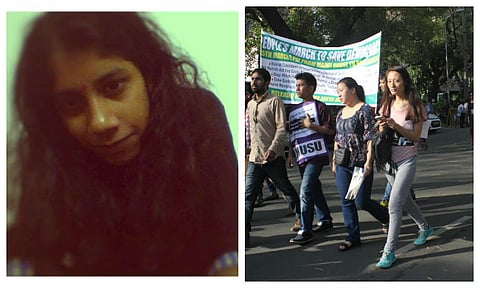

Kathu Lukose says that she’s still not quite able to believe that her documentary on last year’s agitations in Delhi’s Jawaharlal Nehru University – March March March – may not be screened at Kerala’s International Documentary Short Film Festival.
“I have never heard of something like this, having lived in Kerala,” she says, of the sudden refusal of the Information and Broadcasting Ministry to grant the film exemption from Censor Board certification, customarily given to many films on the festival circuit.
According to reports, of the nearly 170 films sent for exemption by the IDSFF organisers, only three films were denied permission. The Unbearable Being of Lightness – which narrates incidents related to the suicide of University of Hyderabad scholar Rohith Vemula – and In The Shade of Fallen Chinar, portraying the lives of young Kashmiri artists, have also been denied permission to be exhibited at the festival.
Decrying the move, Kathu says that she is thinking of legal action against the Ministry’s decision. Speaking to TNM, the 27- year old says that she came to this course of action not simply because she wants to exhibit her work but also because the thought of denying permission to creative works does not sit well with her.
“It was on Friday that I received email communication from the State Chalachitra Academy saying that the festival had been denied permission to exhibit the documentary. Only then did I come to know that there was this procedure of sending the works to the Ministry for approval. It was new to me that there was censorship,” she says.
Kathu says that she will speak with PN Ramachandra, who made The Unbearable Being of Lightness, and NC Fazil and Shan Sebastian, who made In the Shade of Fallen Chinar, before finalising the plan to move court. “If they agree we will move together to the court. But I will not step back even if they don’t agree,” Kathu says.
Kathu says that she is resolved in the plan despite reassurances from the Chalanchitra Academy that it will appeal against the Ministry’s decision. “The Academy will file an appeal against the denial, I was told. But I don’t think that will produce anything in our favour. Let me see,” says Kathu, a native of Thiruvananthapuram.
She is also planning to show the film at other festivals. “I have got a few phone calls offering me platforms to exhibit the movie. One of them was from one of the organisers of the ViBGYOR film festival,” she says. The ViBGYOR festival is organised every year in Thrissur jointly by a group of film societies.
.jpg?w=640&auto=format%2Ccompress)
Meanwhile, it seems that Kathu and the other directors are likely to receive support from the Kerala government, with Cultural Affairs Minister AK Balan taking to social media to say that the denial of permission for the films cannot be accepted, and that Kerala will oppose this move in a united manner.
"Why are certain people afraid when contemporary issues are discussed in films? The films are not anti-national simply because they discuss contemporary issues. This is not a good tendency. No other state in the country conducts a documentary short film festival. The festival is an inspiration to other states," Balan wrote in an FB post.
March March March chronicles the aftermath of the February 9 incident in which some students of JNU were accused of raising ‘anti-national’ slogans. The film narrates the series of agitations, arrests and protests that followed, leading up to the Student Union elections that were held in September last year.
It is the first independent work of Kathu, who graduated from JNU’s School of Arts and Aesthetics last year. While Kathu did the direction and cinematography for the film, it was produced by her mother Mary Lal.